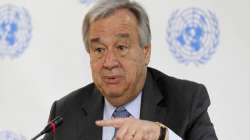Mankind so unprepared for COVID-19, world lacks solidarity: UN Chief
US Secretary-General Antonio Guterres said mankind is "so unprepared" for COVID-19, while pointing out that there is not enough humility, unity or solidarity in the world.

US Secretary-General Antonio Guterres said mankind is "so unprepared" for COVID-19, while pointing out that there is not enough humility, unity or solidarity in the world. Guterres earlier on Thursday brought together the principals of 31 UN system entities in a virtual meeting of the UN System Chief Executives Board for Coordination (CEB), the longest-standing and highest-level coordination forum of the UN system, Xinhua news agency said.
As CEB chair, the secretary-general gave an overview of the state of the world, reflecting on the future of multilateralism, beyond the immediate response to the COVID-19 pandemic, as well as on the risks brought by the current crisis for human rights, global governance, ethics and international cooperation.
"What is clear today is the fragility of humankind and the planet. With all the scientific progress we still don't know how to deal with a virus, we are so unprepared. It is clear there is not enough humility, unity and not enough solidarity in the world," he said.
With this in mind, the secretary-general brought to the board's attention the UN policy briefs on the effects of COVID-19, released over the past several weeks, as strengthening the fundamental role of the UN as a global platform.
Board members David Malpass, president of the World Bank Group, and Kristalina Georgieva, managing director of the International Monetary Fund, warned of negative global economic repercussions of COVID-19, with incoming data projecting more adverse scenarios than only four weeks ago, including a high risk of increase in poverty and inequality.
Malpass reiterated the call for a debt moratorium for developing countries and underlined the importance of having a human focus during the recovery. "We need to open the economy in a way that people can rise beyond poverty."
Georgieva, while mentioning the different risks associated with the pandemic, also reflected on some opportunities such as "leapfrogging to a digital world after the crisis" and focusing on low carbon climate resilience.
Recognizing the necessity of a human-centered recovery, CEB principals rallied behind the secretary general's call to action on human rights and related policy brief on "COVID-19 and human rights" and emphasized that responses, which respect and are shaped by human rights, result in better outcomes in beating the pandemic.
CEB members considered the challenges of financing the COVID-19 response while keeping up the pace of implementation of the Sustainable Development Goals. They joined the UN secretary-general's call for bold climate action to be embedded into all aspects of economic recovery, with recovery packages delivering green jobs and driving sustainable growth.
The board also focused on data as a strategic asset to inform the post-pandemic recovery. The "Data Strategy of the Secretary-General for Action by Everyone, Everywhere: With Insight, Impact and Integrity" was introduced as an overarching reference for data-driven leadership.
Furthermore, the principals endorsed a system-wide roadmap for innovating UN data and statistics, an ambitious collective effort by the UN system's chief statisticians to innovate UN data and statistical outputs in support of member states and the international community.
Echoing the UN secretary-general's call for building back better by choosing policies, investments and actions that protect nature and are carbon neutral, CEB members saw the need for a stronger focus on nature across the whole UN system and decided to develop a common approach to integrating biodiversity and nature-based solutions for sustainable development into the UN's policy and program planning and delivery.
The board considered it to be the UN system's collective responsibility to ensure recognition of 2020 as a "Super Year" for nature in which the international community heeded the dramatic warnings -- from the harrowing impact of the COVID-19 pandemic to the devastation caused by wildfires across the globe -- and seized the opportunity to act decisively to reset humanity's relationship with nature and to set the world on track to a more sustainable future.
ALSO READ | COVID-19 crisis increasing psychological suffering: UN chief
ALSO READ | Vizag chemical plant gas leak incident needs to be fully investigated: UN chief